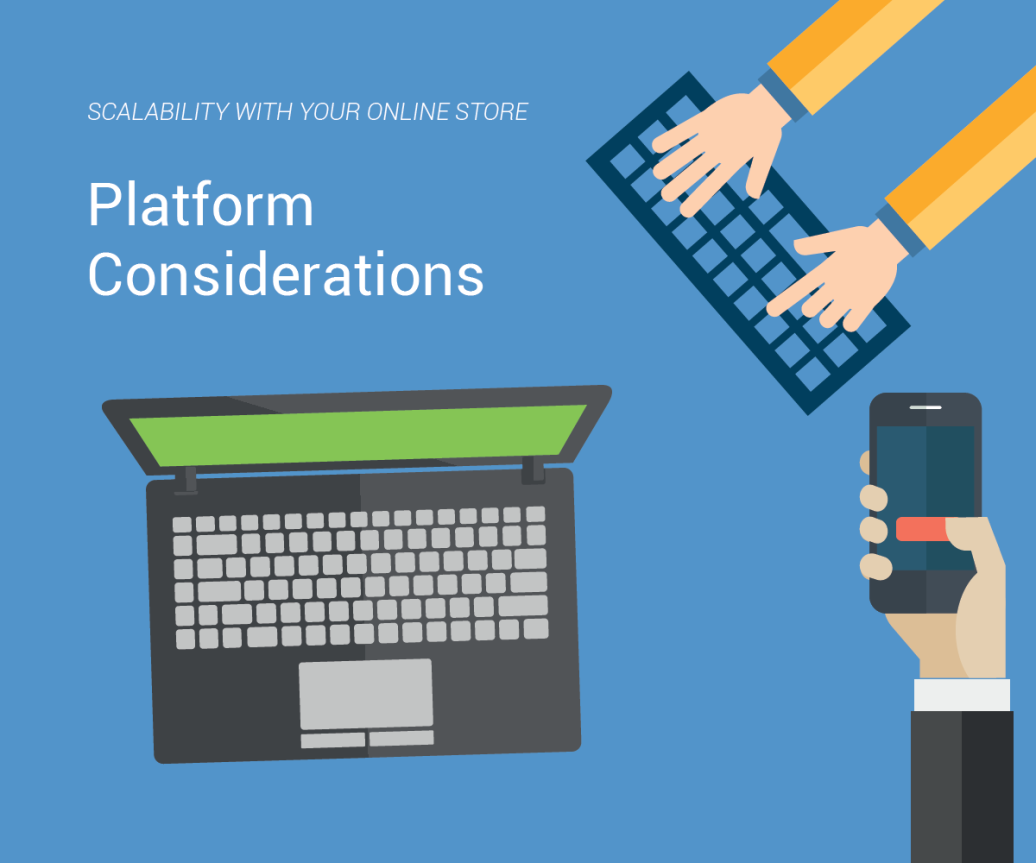| Read Part 3 of 20 in our 7 Keys to Successful Web Development series below! |
Platform Considerations
Choosing the right platform for your website is crucial. Once you have outlined what your needs are for your website, you can begin to research which ecommerce platform best fits your needs. Remember to consider, costs, scalability, and integration needs. Here are some options to consider.
1 . BigCommerce: This company has an uptime record of 99.99 percent, which is impressive compared to the industry norm of 99.5. Every second your online store is up and running is time for you to be moving toward success. BigCommerce is fast, has higher conversion rates, and multiple layers of security, such as firewalls, intrusion detection software, and human oversight on top of it all. Bigcommerce focuses heavily on feature that help you to grow your business.
- Wide variety of response ecommerce template designs
- In class marketing and conversion tools to increase sales and drive more traffic
- Industry leading performance and stability, with uptime more than 99.99% and fast loading time
- Cloud based platform 1⁄4 the cost of on premise solutions
- Robust faceted search options
BigCommerce offers four main plans for their platform:
- “Standard” – A full featured online store
- “Plus” – Optimized conversion and customer group management
- “Pro” – High volume security and analytics
- “Enterprise” – Full feature cloud ecommerce selling solution
2 . OroCommerce: OroCommerce is an open source Business to Business eCommerce application built with flexibility in mind. OroCommerce can be customized and extended to fit any B2B commerce needs. OroCommerce is built from the ground up as a B2B application. The application includes such features as advanced search capabilities, a built in CMS system with support for multiple price lists, quote to order process, quick order forms, support for multibusiness and corporate customer accounts, eliminating the need to compromise by extensively customizing existing eCommerce applications.
- Corporate Accounts
- Multiple Websites
- Personalized Catalogs
- Multiple Price Lists
- Quick Order Form
- Configure to Quote and Quote to Order Workflow
- Store Frontend Optimized for B2B Buying Experience
- B2C Style Branded Frontend and Experience
- Mobile Optimized Buyer and Sales Representative Experience
- Built in flexible content management
- Multiple price lists
3 . Magento: Magenta’s CMS platform for ecommerce is one that offers business owners out-of-the-box functionality. Oversight is provided for items such as vouchers, store credits, gift cards, and packing slips. It can also handle payments through alternative sources to credit and debit cards. Magento is rich with off the shelf extensions and a global ecosystem of expert partners.
a. Largest eCommerce developer Community on the Market
i. Thousands of extensions
ii. 100’s of responsive ecommerce template designs
iii. Largest number of third party integrations
b. Get support for multiple languages and currencies
c. Control multiple websites and stores from one administration panel
d. In-class marketing and conversion tools to increase sales and drive more traffic
e. Extensive Catalog Management Tools with the ability sell everything from Simple products to complex KITs and Bundles.
i. Related products, up-sells, and cross-sells
f. Extensive Suite of Features for B2B Functionality
g. Robust Promotional Feature Set allowing for everything from $ off to BOGO’s and more.
i. Set promotional pricing for specific stores, categories, customer groups, or Products
ii. Create flexible coupons for specific stores, customer groups, time periods, products, and categories
iii. Export coupon codes for offline distribution, email, newsletters, and more
iv. Track and report coupon usage
h. Create customizable category landing pages
i. Search Engine Optimization tools for Google sitemap, friendly URLS, and metadata
j. Use the content management system to create and easily edit pages and content blocks
k. Use a Web Services API for easy integration between Magento and third-party
applications
Want the full “7 Keys to Successful Web development” whitepaper? Download it now!



Leave a Reply
You must be logged in to post a comment.